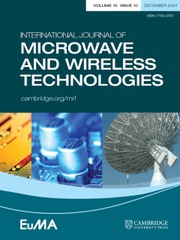Experimental verification of super-compact ultra-wideband (UWB) polarization and incident angle-independent metamaterial absorber
Published online by Cambridge University Press: 15 September 2020
Abstract
In this paper, a super-compact ultra-wideband (UWB) metamaterial absorber (MMA) is presented. The absorber design consists of an inverted L-shaped structure and a diagonal rectangular-shaped structure. The capacitive coupling between these two structures not only provides UWB nature but also provides a super-compact absorber design. The dimension of the unit cell arrangement is 5 × 5 mm2 and printed on a low-cost FR-4 substrate of thickness 1.54 mm (0.061λlowest). The design absorber provides more than 97% absorptivity from 12 to 21 GHz for normal incidence electromagnetic (EM) wave. However, the proposed MMA has a full width at half maximum absorption bandwidth of 11.71 GHz from 10.34 to 22.05 GHz. Moreover, the surface current distributions have been analyzed to understand the absorption mechanism of the MMA. The stability of the proposed design is validated with different incident angles (for TE and TM modes) and different polarization angles. Finally, the absorber design is fabricated and verified experimentally. Furthermore, the UWB frequency range, high absorption, ease in design and fabrication, and cost-effective make it suitable for different quality applications in stealth technology, thermal imaging, radar detection, antenna systems, and other EM devices.
- Type
- Metamaterials and Photonic Bandgap Structures
- Information
- International Journal of Microwave and Wireless Technologies , Volume 13 , Issue 8 , October 2021 , pp. 789 - 799
- Copyright
- Copyright © The Author(s), 2020. Published by Cambridge University Press in association with the European Microwave Association
References
- 6
- Cited by



